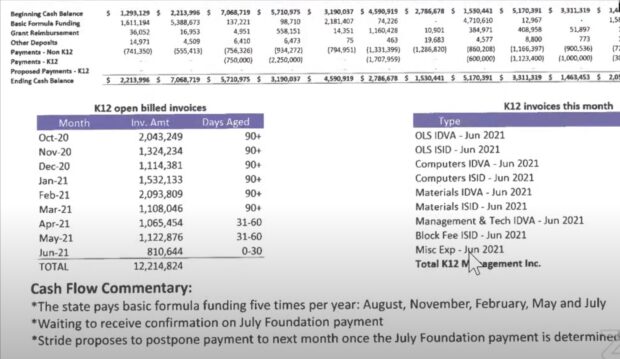After a tense legal proceeding, the Idaho Public Charter School Commission voted to continue exempting Idaho Virtual Academy from a financial accounting practice required by every other school it authorizes.
The practice of annual charter school financial reports was put in place to evaluate each school’s financial health.
Yet IDVA convinced commissioners that the structure of the school’s financial statements do not align with the commission’s metrics so the exemption is warranted. Those financial statements are produced by K12, the school’s third-party vendor.
In a three-hour hearing Friday to consider the conditional renewal of IDVA’s contract, the commission rejected commission director Jenn Thompson’s recommendation to remove a rare exemption that prevents her staff from publishing a complete financial report based on data from the school’s audit.
“I am concerned that the expectations that we have for this school are different from the other schools that we have in our portfolio,” Thompson said. “This exemption has a profound impact on public transparency.”
Allowing the exemption to remain prevents adequate transparency and accountability, she told commissioners at the hearing.
Appointed by state leaders, the seven-member commission evaluates financial performance reports created by Thompson and her staff that are drawn from eight measures — variables such as current assets, debt margins and net cash flow.
The exemption precludes the commission from publishing seven of those measures on the report. The only measure the school is held accountable to is the “default” measure, which considers whether the school is paying its bills on time.
But IDVA argued that those financial metrics are inappropriate and not applicable. What’s more, that exemption was carefully vetted through public meetings and staff reviews. And the school already provides full transparency on its website — contracts, budgets, payroll, financial statements, and board minutes.
During the proceeding, the commission took a close look at a typical balance sheet and a statement of activity created for the school’s governing board. It included columns of data, computations, acronyms, abbreviations, lines of expenses for computers and fees, and summary notes at the bottom.

For someone without a financial or accounting background, the reports are challenging to fully understand.
“And they did argue that they believe they’re very transparent, but it’s also clear that you have to piece a lot of things together in order to see the picture,” said Rachel Kolts, deputy attorney general.
And removing the exemption is consistent with prior commission decisions, Kolts said.

Kolts served as legal council for Thompson and the charter commission staff, while attorney Amy White served as IDVA’s council.
White attacked the validity of Thompson’s data and her conclusions, pointing out several accounting and mathematical errors, typos in the evidence and her refusal to provide data. White’s expert witness said there were at least a half-dozen mistakes on one of Thompson’s exhibits.
“We vehemently disagree with the conditions. The materials that have been provided were simply a mess, with small and large factual errors,” White said.
“IDVA is the most financially secure school in the state,” White said. “IDVA met every standard and exceeded some. There is no legal ground to put any condition in place.”
Of particular interest was a disagreement between Thompson and White about debt. Thompson’s analysis concluded that the school operates with approximately $12 million of debt — a claim White said was false.
The school’s finance manager, Felicia Boyle, then testified that IDVA is not indebted to K12 because of a negotiated agreement.
Along with the disagreement over the school’s debt, questions surfaced about the school’s credit memo, a deficit protection clause, and the total revenue paid to K12 annually. The commission had more questions than answers.
Commissioner Wanda Quinn ultimately agreed with IDVA and made a motion to renew with no conditions.
“For our purposes, they are serving students and they are serving them well. And fiscally and operational they are meeting standards,” Quinn said.
Commissioner Karen Echeverria disagreed, and she suggested removing the exemption.
“These finances are very hard to piece together and very hard to find … This commission has established a set of standards for how finances are going to be reported and this would be the only school that we aren’t compelling to comply with those,” Echeverria said.
Commissioners Brian Scigliano and Nils Peterson supported Echeverria; commissioners Sherrilynn Bair and Dean Fisher supported Quinn.
Chairman Alan Reed admitted that more transparency is needed, but he opted to renew the school without conditions and then “work out the problems we have.”
The commission also sided with IDVA on Thompson’s proposed 1% increase to the school’s alternative graduation rates — graduation trends of at-risk students. By its vote, the commission concluded that IDVA’s current rate is sufficient.
IDVA was granted a new five-year contract with no conditions.
IDVA has been in operation for 20 years. It serves 1,731 students in K-12. The school also operates an online alternative school, Insight, that serves 296 students in 9-12. The schools employ 118 fulltime and three part-time staff members. To read more about the school’s teacher contracts, annual budgets, school expenditures like payroll and financial statements, and board minutes and agendas visit the school’s website.
